Parents will always be troubled if their children are bullied, but incidents become especially hurtful during the middle and high school years. Adoptees may be vulnerable to comments about how “different” they are from their families or from peers. And when those comments cross the line from nosiness to cruelty, they can wound a teen’s evolving identity. How should you respond when your child is being bullied? What can you do to prevent it?
Instill racial pride and offer support. For the past two years, I’ve been involved in a longitudinal research study on transracial adoption. The results clearly demonstrate that the more “racial socialization” adoptive parents provide, the less stress a teen will experience due to discrimination. Transracial adoptees need strong connections with members of their own race to build a positive racial identity. Prepare your child to face racism, sending the message (or even saying directly) that, “Racism is out there, but don’t let it stop you!”
Talk about how to handle bullies. Don’t wait for an incident to occur, and know that your teen may not always share what’s happening. Behavioral signals may include withdrawal, irritability, insomnia, and so on.
Adoption expert Lois Melina lists four questions parents should ask their children when involved with bullying:
- What happened?
- How did that make you feel?
- What did you say or do when that happened?
- If something like that happens again, do you think you will deal with it the same way?
- Arm your children with a repertoire of responses: “What you said really offends me. Please don’t talk to me that way again” or “You shouldn’t say that to me or anyone else.”
Don’t let your child go it alone. Preteens and teens often think they should deal with bullying and racist remarks on their own, but adult intervention is critical. Not intervening is the real mistake.
If your child has been bullied, tell the appropriate school staff member — the guidance counselor or the principal — or the bully’s parents. If physical intimidation is part of the problem, notify the police. When 14-year-old Jenny told her parents that Brenda, a senior at school, was bullying her, they spoke with the guidance counselor. She brought the two girls together to let Jenny confront Brenda in a safe environment.
A school with a good anti-bullying program will give daily messages of support to its students. In addition to clear ground rules and formal programs, there might be posters calling for cyber-bullying to stop and urging bystanders to speak up. If you are not part of a community that supports this idea, you will need to be strong to go against the norm.
Deflate a bully’s power. You can talk about the fact that some people have so little self-worth that they can feel good about themselves only when belittling others. This insight doesn’t excuse bullies, but it deflates the emotional impact of their remarks. Thirteen-year-old Mike was teased about being adopted. He learned from classmates that his bully is the youngest of three brothers and gets picked on a lot at home. Knowing this let Mike dismiss everything the bully said.


